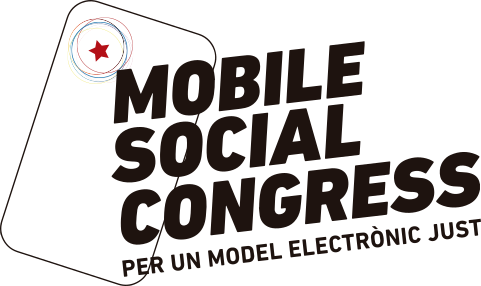Part of the Fair Electronics campaign, the Mobile Social Congress is a space promoted by SETEM Catalunya to meet, reflect and raise public awareness about the model of consumption and production of electronic devices and information and communication technologies.
The electronics industry is one of the most dynamic and vital sectors of the world economy, and every year Barcelona serves as its main showcase with the Mobile World Congress. The sector’s leading transnational companies present annually the latest advances on their
products. Likewise, it is also necessary to put on the table the social and environmental costs currently involved in the production of new phones and tablets.
The Mobile Social Congress was created as an alternative space to the Mobile World Congress. The aim is to encourage reflection and raise awareness about the impacts of electronics’ production and consumption, and to critically analyse them from an ecological, feminist, human rights and labour rights perspective; to denounce an unjust, extractive
and consumerist model, and to come up with new ways of producing and consuming electronic devices, respecting the rights of people and the environment, while using resources responsibly so that we can provide for future generations without violating the fundamental rights of other peoples and regions.
Why do we need a Mobile Social Congress?
The electronics industry requires mineral resources in large quantities with an environmental and social impact on the communities that suffer from mining extractivism, especially indigenous peoples and impoverished countries. The opacity of global supply chains, and the lack of international regulations to stop corporate impunity, allows the industry's biggest brands to breach labor rights and workplace health and safety regulations wherever they outsource manufacture of its products.
Likewise, corporate irresponsibility also extends to the life cycle of these devices, since for a long time there has been a strong lobby against the repairability of products, and programmed obsolescence has been practised. The result has been that e-waste is the fastest growing waste stream every year. This has unequal impacts on the Global North and the Global South, with the countries of the Global South being in some cases the recipients of this waste, and therefore of the social and environmental problems that arise from it.
Finally, as users, we often have our data hosted on servers whose interests we do not know and which can facilitate access to our communications and data without our control. The same privative logic of capitalism promotes the privatization of knowledge, as is the case with software, and favours a technological sector controlled by a few multinationals. Likewise, the increasing presence of screens in our day-to-day life, addiction and other mental health problems generated by the use of smartphones and social networks, are issues that must be addressed.
We are committed to technological sovereignty and fairer electronics.
Every year, at the Mobile Social Congress, we present a range of topics around these issues, in order to offer the public the opportunity to understand what happens beyond our consumption and use of electronics, and what is being done or can be done to generate change, also presenting innovative initiatives and projects that are committed to technological sovereignty and a fairer and more sustainable electronics.





